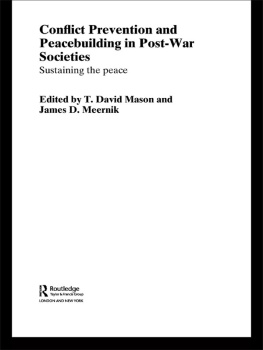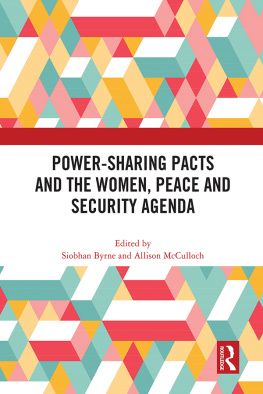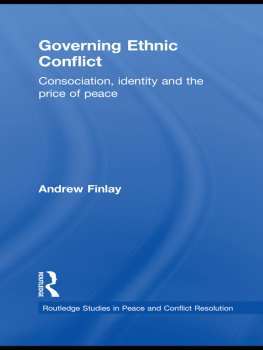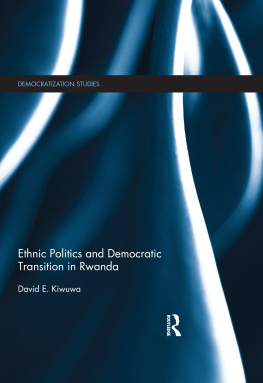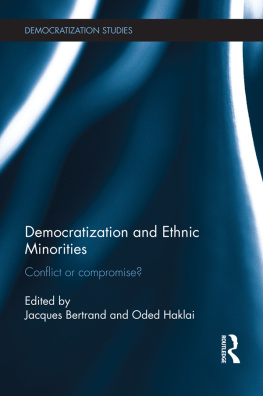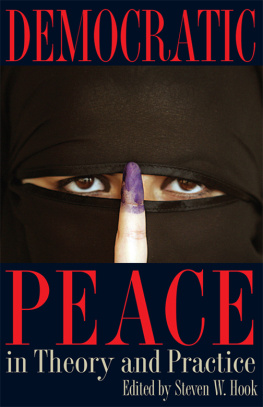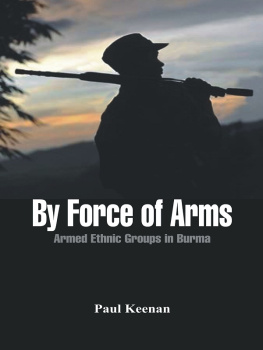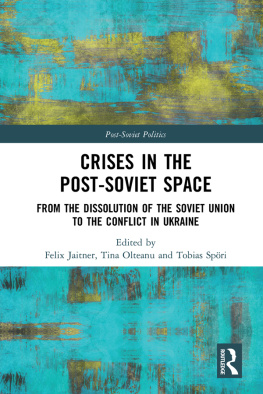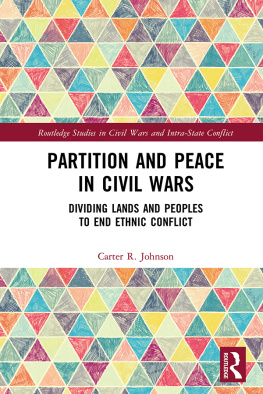Democratization and Ethnic Peace
Democratization and Ethnic Peace
Patterns of ethnopolitical crisis management in post-Soviet settings
AIRAT R. AKLAEV
Russian Academy of Sciences, Institute of Ethnology
First published 1999 by Ashgate Publishing
Reissued 2018 by Routledge
2 Park Square, Milton Park, Abingdon, Oxon, 0X14 4RN
52 Vanderbilt Avenue, New York, NY 10017
Routledge is an imprint of the Taylor & Francis Group, an informa business
All rights reserved. No part of this book may be reprinted or reproduced or utilised in any form or by any electronic, mechanical, or other means, now known or hereafter invented, including photocopying and recording, or in any information storage or retrieval system, without permission in writing from the publishers.
Notice:
Product or corporate names may be trademarks or registered trademarks, and are used only for identification and explanation without intent to infringe.
Publishers Note
The publisher has gone to great lengths to ensure the quality of this reprint but points out that some imperfections in the original copies may be apparent.
Disclaimer
The publisher has made every effort to trace copyright holders and welcomes correspondence from those they have been unable to contact.
A Library of Congress record exists under LC control number: 99072330
ISBN 13: 978-1-138-61245-7 (hbk)
ISBN 13: 978-0-429-45803-3 (ebk)
Contents
The author would like to express his most sincere gratitude to the following organizations and individuals who contributed to the study reflected in this publication.
First of all, I am extremely grateful to the U.S. Institute of Peace owing to whose grant support it has become possible to accomplish the research project and to prepare this book. Obviously, the opinions, findings and conclusions or recommendations expressed in this publication are those of the author and do not necessarily reflect the views of the U.S. Institute of Peace. I am also grateful for the support offered for conducting several portions of the research and some of the research-related travel to the Kennan Institute for Advanced Russian Studies of the Woodrow Wilson International Center for Scholars (Washington, DC) for a 6-month regional scholarship, to the Berghof Foundation (Germany) for a 3-months guest scholarship and to the German Academic Exchange Service (DAAD) for a short-term research scholarship.
Special thanks go to those librarians who granted me access to library resources and pointed me in the right direction as I searched for research materials. Too many people fit into this category to mention them all. I thank the staff at the following libraries: The British Library in London; The Library of Congress, the George Washington University Library, the Smithsonian Institution Library in Washington, DC; the State Library of Literature in Foreign Languages (VGBIL) in Moscow; the Freie University Library and the State Library (Staatsbibliothek) in Berlin.
I want to express my many thanks to Dr. Hanna Newcombe, Betty Truman and Linda Carroll from Peace Research Institute-Dundas for their valuable cooperation during the whole work over the research project. My many thanks also go to the various people who found time in their busy schedules to help me during my field work in Estonia and Lithuania, particularly to Aksel and Marika Kirch, Anu Uljas and Anne Kalling in Tallinn. For contributing to the development of the ideas in this book 1 am grateful to numerous people who commented on various papers presented at several conferences and seminars. I want to thank particularly Dr. Norbert Ropers and Anja Weiss from the Berghof Research Center for Constructive Conflict Management (Berlin) who read parts of the manuscript and provided their thoughtful and constructive comments and suggestions. My special thanks also to my research assistants Kara Madison, Steve and Kristiina Watts for the time they devoted to help me with library research and data processing.
I am very grateful to all those people for their interest in my work and for contributions they made to improving the quality of my effort. All errors and mistakes contained in these pages are, of course, my own responsibility.
As we move into the 21st century two major variables emerge as particularly important and interrelated areas of concern for students of peace On the one hand, the past two decades have witnessed remarkable progress for democracy and the whole period has been recognized as democratizations third wave (Huntington, 1991). The upsurge of democratic governments, starting in 1974 and continuing through the early 1990s, is indeed the sign of political change in contemporary world (Munck, 1994, p. 355). On the other hand, comes the salient role of ethnicity as it affects everything from democratic development to the prospects of peace in multipolar and multicivilizational world.
The widespread proliferation of ethnic conflict across the globe has taken many people by surprise and forced them to reassess prevailing assumptions and beliefs about the direction of historical development and the motive forces of social change. Ethnic conflict has become todays most pervasive and dangerous expression of organized strife. Most of the ongoing violence in todays world are internal conflicts and not classical interstate wars. None of the 31 instances of active hostilities around the world in 1994, for example, were classical interstate wars (Baker, 1997, p. 563). The bitter reality of ethnonationalist strife has prompted many to see in it the seeds of what may become one of the most serious threats to humanity in the coming era. This, in turn, has generated apprehensions about the conflict of civilizations as a sobering prospect for the future course of human development (Huntington 1993; idem, 1997) and a search for approaches by which the clash of cultures and identities can be transcended.
Issues of ethnic peace lie at the core of much of the current debate over the future of the democratic project. The emergence of disruptive ethnic conflicts in many new democracies has led to a pervasive fear that primordial ties can eat away at the democratic process and undermine the foundations of a peaceful, progressive future. The critical question is whether and how ethnic conflict situations can be managed to prevent the turn to violence and be subsequently transformed into constructive arrangements based on democratic principles.
Given the difficulties inherent in mitigating ethnic conflict, some of the analysts were tempted to rush into the conclusion that multiethnicity is bound to overwhelm efforts to consolidate democratic systems. Other scholars contend that this relationship is more complex. An important point made in this regard is that democracy needs to be seen not as part of the problem of ethnic conflict, but as the basis for its solution. This argument is grounded in a strong belief that there are no viable alternatives to democracy as a system of just and stable conflict management. If democracy cannot encompass ethnic diversity, what else can?
The very subject of peace studies warrants interdisciplinary perspectives that transcend traditional academic boundaries and provide for the systematic integration of disciplines relevant for peace. Boulding (1978, pp. 131-2) captured the phenomenon by observing that peace research is an interdiscipline rather than a discipline. It has been rightfully argued by many that disciplinary traditions have created major barriers to the development of theory capable of comprehending new realities in world politics. Precisely because of these boundaries, many comparativists continue to limit their search for causal patterns to the level of the nationstate and rarely develop comparisons or generalizations that incorporate international variables. Many international scholars, on the other hand, err in the opposite direction and attempt to generalize about causation without meaningful reference to political life at the national or sub-state level.


